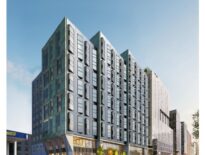
Boston Mayor Marty Walsh addresses the Greater Boston Chamber of Commerce on Oct. 8, 2019. Photo courtesy of the city of Boston.
Boston Mayor Marty Walsh repeated his support for certain eviction protections and called on the commercial real estate industry to find a “balance between profit and [social] impact” in a speech before the Greater Boston Chamber of Commerce Tuesday.
Walsh also called on the business community to help make it easier to build housing in the suburbs and to help boost funding for public transportation.
The mayor touted the work the city has done to free up 3 million square feet of city-owned land for housing development, according to a transcript of his remarks, increase affordable housing requirements for new developments and created a $4 million fund for low-interest mortgages for first-time buyers.
The city has now permitted 30,442 units since 2011, including 6,004 affordable units, three-quarters of which are rental units, according to data released last week by Mayor Marty Walsh’s office. Independent research shows average rents are nonetheless expected to climb again this year despite the addition of around 5,000 new apartments to the market this year.
With hundreds of thousands of new jobs added to the city and state economies, though, Walsh told the audience that to fix the housing crisis, “we need stronger tools” in the city, along with more housing production in the suburbs, adding that “pushing people out of their homes and their communities has to stop.”
“We need the legislature to pass our bills protecting seniors and guaranteeing right-to-counsel for tenants facing eviction,” he said. “We also need owners and investors to take a step back and consider the human impacts of their actions. Profits can’t come at this kind of cost. It’s not a price and it’s not a practice that we’re going to accept in the city of Boston.The bottom line is, housing is not a commodity; it’s a community. It’s where people build their lives.”
Walsh also called on developers to build less luxury housing and more middle-income housing to keep the city’s economy rolling.
“We’ve built luxury apartments, condos and townhouses. That fills a need and it takes pressure off our older housing stock,” he said. “But what’s missing is the middle. And the people who fall through that gap are the people in our offices and our stores and our restaurants, whose hard work makes our economy tick. I understand that investors want to maximize their profits. But there has to be a balance between profit and impact. … And we stand ready to partner with anyone who will step forward to help address this need.”
Walsh said he planned to work with chamber President James Rooney to help identify opportunities to build more middle-income housing.
Walsh also urged the attendees to add their voices to efforts to pass Gov. Charlie Baker’s Housing Choice legislation, currently held up on Beacon Hill. Liberal legislators argue the bill doesn’t go far enough to protect current tenants and communities from gentrification, while small but vocal opposition from homeowners is emerging in some Boston suburbs.
Currently, most new suburban multifamily developments require zoning changes to be built. The Baker bill would reduce the threshold for such votes from a two-thirds majority to a simple majority, a measure which advocates say could help create over 100,000 new homes in the next few years.
Walsh also called for help to improve the state’s transportation systems.
“Recently, I sat with a group of business leaders – you understand the urgency,” Walsh said. “We need your voices to communicate what’s at stake for your workers, your businesses, and our economy. And we need your expertise to help develop solutions. Just as we’ve done in the city of Boston, we need to work together, as partners, on a comprehensive plan to address the statewide need for better transportation. And we need to make the hard decisions necessary to fund and implement that plan.”





